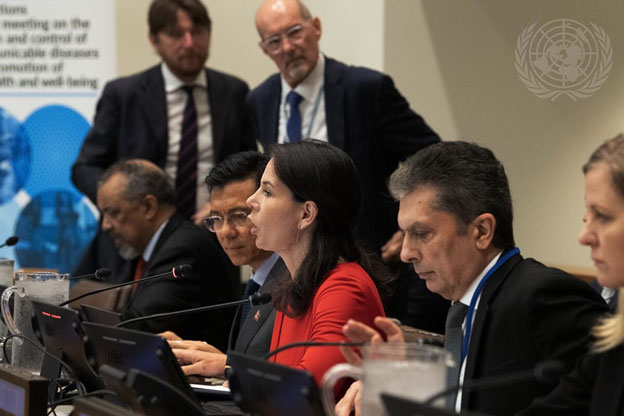UN Member States Convene To Discuss Urgent Need for Equity in NCD and Mental Health Responses
By Global Issues,Oritro Karim
Copyright globalissues

by Oritro Karim (united nations)Friday, September 26, 2025Inter Press Service
UNITED NATIONS, September 26 (IPS) – World leaders convened in New York to deliberate over the efforts needed to address non-communicable diseases.On September 25, the United Nations (UN) convened a high-level meeting on the prevention and control of noncommunicable diseases (NCDs) and the promotion of mental health and well-being during the 80th session of the General Assembly (UNGA80).
Organized in collaboration with the World Health Organization (WHO), the conference brought together numerous heads of state and government, many of whom acknowledged that progress toward the Sustainable Development Goal (SDG) of reducing premature mortality from NCDs by one-third by 2030, will most likely not be achieved. Most participants also stressed the urgency of stronger global cooperation and financing to advance health promotion and disease prevention, while addressing the economic, social, and environmental factors driving premature NCD mortality.
According to figures from WHO, NCDs are the leading cause of premature deaths worldwide, claiming more than 43 million lives last year, with 18 million of these deaths occurring prematurely. Amina Mohammed, the Deputy-Secretary General of the UN, informed the panel that approximately one person under the age of 70 succumbs to an NCD every two seconds. Additionally, about 1 billion people globally live with mental health conditions and 2.8 billion more can’t afford a healthy diet. Roughly three-quarters of all NCD deaths are concentrated in low- and middle-income countries, with conflict and crisis-afflicted areas being the most vulnerable in the world.
“Every premature death from NCDs is lost potential,” said Lok Bahadur Thapa, President of the United Nations Economic and Social Council (ECOSOC). “Every untreated mental health condition is a missed opportunity for inclusion and dignity. If we place solidarity, equity, and investment at the core of our response we can reverse current trends and ensure that NCDs and mental health conditions are no longer barriers to sustainable development, but drivers of shared progress for humanity.”
In recent years, progress in tackling NCDs and mental health challenges has slowed considerably, leading to the deepening of inequities around the world. In response, the UN announced three new targets: 150 million fewer global tobacco users, 150 million more people with access to mental health care, and 150 million more individuals with hypertension under control.
“To achieve these targets we must strengthen primary healthcare as the foundation of universal health coverage,” said Mohammed. “We must work across sectors and partners to address the social, economic, and environmental determinants and the market forces that shape how people live. We must elevate psychosocial care in crisis settings. We must place people living with NCDs at the center of our efforts. We must be accountable for our commitments.”
Several speakers highlighted systemic weaknesses in national health systems, particularly the misallocation of funding for response efforts. Many emphasized that a key priority for future NCD-response efforts should be greater investment in disease awareness and prevention rather than treatment. Belgian Prime Minister Bart De Wever remarked that prevention places a far lighter burden on national budgets than treatment and delivers high returns on investment by reducing productivity losses and alleviating pressure on healthcare systems.
“We must remember that health does not start in clinics and hospitals. It starts in homes, schools, streets and workplaces,” said Director-General of WHO Dr Tedros Adhanom Ghebreyesus. “In the food people eat, the products they consume, the water they drink, the air they breathe, and the conditions in which they work.”
Additionally, mental health services remain particularly underfunded, with global expenditure averaging just USD 2 per capita, falling to below 25 cents per capita in some developing countries. Prime Minister of Fiji Sitiveni Rabuka informed the panel that mental health challenges affect nearly every Fijian family, with trauma, stress, and substance abuse particularly concentrated among youth, significantly hindering social development.
“Mental illness is one of the most persistent NCDs yet too often it remains invisible,” said Gaston Browne, Prime Minister of Antigua. “Its burden on health productivity and dignity is greater than any other chronic illness but stigma silences voices and delays urgent care. We are focused on transforming mental health from a whispered concern to national priority moving from outdated institutions and practices to modernized education and collaborative partnership…Our government alone cannot solve this issue so we are using an all of society approach as we engage families, community associations, churches and regional neighbors.”
Prime Minister of the Bahamas Philip Davis underscored the vulnerability of healthcare systems in low-lying coastal communities, noting that a single hurricane can wipe out years of economic growth in parts of the Bahamas, severely undermining the capacity of health systems to respond when they are needed most. Moreover, limited funding and support for gender-specific research often leave women and girls—who are disproportionately affected by NCDs and mental health challenges in developing countries—overlooked in response efforts.
Several speakers also underscored the importance of promoting healthy lifestyle habits as a key strategy for controlling NCDs and improving mental health. For example, President of Suriname Jennifer Geerlings-Simons urged for stricter limits on screen time and social media usage, warning of their damaging effects on mental health and social development, particularly for young girls.
Glenn Micallef, the European Commission’s Commissioner for Intergenerational Fairness, Youth, Culture, and Sports, emphasized the role of arts and culture in preventing and managing NCDs, noting their links to social cohesion, reduced loneliness, and improved mental wellbeing among young people. He also highlighted the potential of emerging tools such as artificial intelligence and digital assistive technologies to expand access to the arts.
Furthermore, another key aspect of the high-level meeting was to promote physical activity as a course of action against NCDs and mental health challenges. According to the President of the International Olympic Committee and double Olympic swimming champion Kirsty Coventry, eighty percent of adolescents and one-third of adults are not doing enough physical activity, which risks 500 million new cases of preventable diseases by 2030.
Physical activity is recognized as one of the most effective, low-cost, and high-impact forms of disease prevention and mental health management, saving millions of lives each year. “At a young age I was diagnosed with asthma and my parents did not want to put me on the number of drugs that was recommended,” recalled Coventry. “We went to another doctor who suggested swimming, and it worked. It taught me how to control my breathing, how to grow my lung capacity, and I never had to go on the level of dosage that was recommended when I was 2 years old.”
“This multiplier effect is being recognized,” added Coventry. “Development banks worldwide have pledged ten billion dollars by 2030 for sport and sustainable development projects. Their commitment reflects a growing recognition that investing in sport can generate ripple effects for health, education, inclusion, youth empowerment and so much more.”
During the meeting, member states deliberated over a political declaration on NCDs and mental health. The text calls encourages stakeholders to fast-track efforts to accelerate progress on NCDs and mental health and identified clear goals to achieve by 2030, including reducing the premature NCD mortality rate by one-third, 150 million fewer people using tobacco and 150 million more people with hypertension. This declaration is also among the first to clearly include mental health in its language.
Although there was strong consensus for the declaration from member states and regional alliances, it ultimately failed to receive a formal endorsement by the end of the meeting, with some member states voicing their objection, including a veto from the United States. The declaration will now be put to vote at the General Assembly.
IPS UN Bureau Report
© Inter Press Service (20250926180542) — All Rights Reserved. Original source: Inter Press Service



